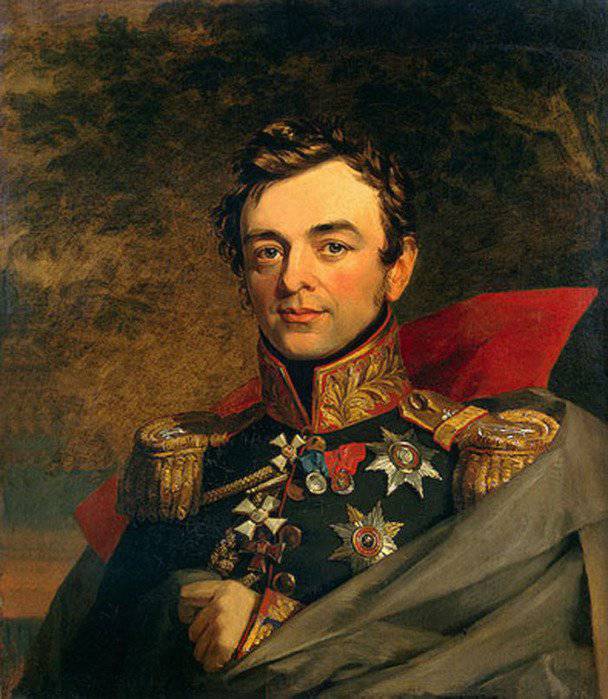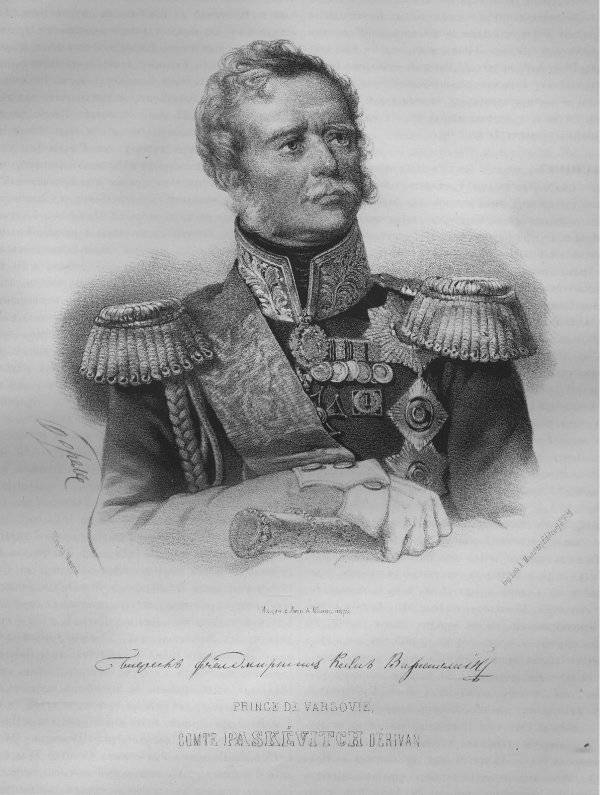Cavalier of all Russian orders Ivan F. Paskevich
Few people could have imagined in 1782 year what a life rich in wars and events awaits Ivan Fyodorovich Paskevich, born in a non-poor landowner family. The father, Fedor Grigorievich, owned five hundred peasants. In addition, the grandfather of Ivan Fedorovich held a prominent position at the court of the Empress. As a result, receiving home education, at the age of 11, Paskevich was assigned to the page corps and became the life page of Paul I in 1800, and shortly before the emperor's death, he became an adjutant, receiving the rank of lieutenant of the Preobrazhensky regiment. Due to the death of Pavel, Paskevich did not like to recall this time spent at court.
Ivan Fedorovich received his first assignment to the army in 1805. He went as adjutant to the Michelson army, which at that time was located between Grodno and Brest-Litovsk and did not actively participate in the hostilities against Napoleon. The battle of Austerlitz, which ended with the defeat of the troops of the Third Coalition, ended the confrontation, not allowing Paskevich to take part in the battles.

Nevertheless, Ivan Fedorovich did not have to wait long for new battles. In anticipation of the war with the Ottoman Empire 1806 Michelson is appointed commander of the Moldavian army. In the same year, Paskevich, for the first time, would show himself as a brilliant officer and receive the first awards. In March, under his efforts, thanks to his efforts, several columns of Russian troops who had lost their way in the darkness would go to their positions, and Paskevich would receive the order of St. Vladimir 4 degree. Later, Ivan Fyodorovich was in the detachment that blocked Ismail. During this war with Turkey, Paskevich traveled twice to ombudsman in Constantinople and distinguished himself in more than one battle.
In 1810, he was recalled to Kiev, where he joined the command of the 26 Infantry Division. The campaign against Turkey brought Paskevich the rank of major general. In addition, he earned four more orders, in addition to the mentioned St.. Vladimir, including the Order of St.. George 3-th and 4-th degree, as well as a golden sword with the inscription "For courage." At that time, Ivan Fedorovich was 28-th year.
The beginning of the Patriotic War 26-division met in the corps of General Rajewski, who was part of the 2-th army of Bagration. Her share was a heavy retreat, with the beginning of the war Napoleon set Marshal Davout with the task of cutting off Bagration from Barclay de Tolly’s 1 Army. To accomplish the task, the Iron Marshal was assigned a corps in 50 thousand people. Comparable forces of Jerome Bonaparte, pursued Bagration from the west. To connect with the 1-th army of Barclay, Bagration needed to force the Dnieper. In the hardest battle under Saltanovka, Raevsky’s corps managed to detain Davout and even convince the French marshal that the 2 Army was ready to accept the battle. 26-division of General Paskevich covered himself in this battle with unfading glory.
Raevsky's corps fell to defend Smolensk before the unification of the Russian armies. General Paskevich was allocated a section of defense, which on the very first day fell a powerful blow to the French. The division of Paskevich defended the central fortification of Smolensk - the Royal Bastion. He was stormed by Nei's selective infantry, but did not achieve success. With the approach of the Russian armies, Raevsky was replaced by the general corps of the infantry corps. Dokhturov.
After Smolensk, the 26 Division actively participated in the rearguard battles, detaining the French at the Kolotsky monastery of August 23. In the battle of Borodino, the division of Paskevich defended Kurgan height to 11 in the morning, when at the cost of enormous losses the French managed to take the height for a short while. Raevsky's corps was almost completely destroyed. In the central position he was replaced, as was the case near Smolensk, by the corps of General Dokhturov. For Borodino, Paskevich received the Order of Saint. Anna 1 degree.
With the abandonment of Moscow, Ivan Fedorovich is actively teaching replenishment arriving at his division. Paskevich’s prudence was completely justified. October 12 his division enters the battle for Maloyaroslavetsy. The bridge over the Luzha River was a strategic point, and its capture would have allowed Napoleon’s army to retreat to the south, to the provinces not destroyed by war. Thanks to commanders like Paskevich, the French were forced to retreat along the Smolensk road that had already been plundered.
In a three-day battle near the village of Krasnoe, the troops under the command of Ivan Fedorovich finished off the remnants of the corps of Ney, the latter himself almost was captured. After Krasny, Paskevich replaced Nikolai Nikolayevich Raevsky, who had fallen ill as the commander of the 7 Infantry Corps, and in this position, with the detachment of Miloradovich, entered the Duchy of Warsaw. Thus began the foreign campaign of the Russian army for the already famous general.
Soon, Paskevich's detachment was detached to block the Molin fortress. Its active assault was not possible due to the lack of siege artillery, but this problem was solved by suitable Prussian reinforcements. However, the truce concluded with the French, the capture of the fortress delayed. During the truce, the Polish army was formed under the command of Bennigsen, which later became the unit of Paskevich.
Later, the division of Ivan Fedorovich changed the armies of M.S. Vorontsov blocked Hamburg, then Paskevich was assigned to the 2 Grenadier Division, commanding which to take part in the Battle of the Nations near Leipzig, the battle of Arsi-sur-Habe, and then during the capture of Paris, his troops attacked Belleville Heights and Menil-Montyan. For the storming of Paris, Ivan received the order of St.. Alexander Nevsky was recommended to the future emperor, then the grand duke, Nikolai Pavlovich.
With the completion of the Napoleonic warrior, the renunciation of Bonaparte Paskevich is sent to Riga. Ivan takes a vacation and goes to the family in Little Russia. Returning from vacation, Paskevich learns about the return of Napoleon from the "honorary" link to the Elbe and, in accordance with the instructions, moves to Paris. The news of the defeat of the French emperor at Waterloo finds Paskevich not far from Frankfurt am Main. After the final defeat of Napoleon, Ivan Fyodorovich returns to Russia, enjoying the full confidence of the emperor.
In 1816, Paskevich receives an assignment to investigate a case on the non-payment of taxes by peasants in the Lipetsk district. According to the results, it turned out that the local bureaucracy cheated with taxes. With the peasants the charges were dropped, and the officials of Smolensk province were removed from their posts. A year later, Ivan Fedorovich was entrusted to accompany Grand Prince Mikhail Pavlovich on a two-year trip through Europe and the Russian Empire.
From 1819 to 1826, Paskevich lived with his family in Vilna, commanding troops stationed at the western border of Russia. Here he stayed until the Decembrist uprising. In 1826, Paskevich was summoned to Petersburg and appointed a member of the Supreme Court over the conspirators. During the proceedings, he voted for the most severe punishments for the rebels. From this point on Paskevich enjoys the full confidence of the reigning emperor.
In 1826, Nicholas I sends Ivan Fedorovich to the Caucasus to “assist General Yermolov,” whom he did not trust because of the latter’s sympathetic attitude towards the exiled Decembrists. Formally, Paskevich submitted to Yermolov, however, he had the authority to remove him if necessary. This aggravated the relations between the commanders to the extreme. The tacit opposition continued until the 1827 year, when Yermolov resigned.
A separate Caucasian corps has already won several victories over the Persians, in a war that began in 1826, Paskevich brought this war to a crushing final for Persia. Forcing Tehran to pay a huge indemnity and transfer the Erivan and Nakhchivan khanates to the Russian Empire. However, Paskevich did not succeed in civil affairs in the Caucasus. If Yermolov was not loved in the Caucasus, then Paskevich was openly hated, this, of course, did not favorably affect the highlanders.
But in the affairs of the military, Ivan Fedorovich always succeeded. In the war with Turkey, 1828-29, he managed to get through to the fortress of Erzurum - the most important strategic base of the Ottoman Empire in Asia Minor. Through the efforts of Paskevich, the army of the Turkish Sultan in this region was completely destroyed and scattered; these events had a huge impact on the course of the campaign. For the capture of Erzurum, Ivan Fedorovich received the Order of St.. George 1 degree, becoming 4 and the last in stories Russian full holder of this award.
After the victory over the Turks, Paskevich spent two more years serving as governor-general in the Caucasus. In 1831, he was transferred to the military commander in Poland. Literally in the month of 4, Ivan Fedorovich managed to crush the rebels. Warsaw was taken on the anniversary of the Battle of Borodino, and Paskevich sent his grandson Suvorov with a report to Nikolai. A doubly symbolic gesture. For this victory, Paskevich was awarded the title of the Most High Prince of Warsaw. Started 25 years of routine Polish governorship.
In 1848, Paskevich again takes command to quell an uprising. This time the help turned out to be needed by the Austrian crown. Emperor Franz Joseph was saved by the power of a Russian weapons. That was the help of Nicholas I to the most august relative. Franz-Joseph, as is customary in family relations, complicated by politics, repay ingratitude: supporting the opponents of Russia in the outbreak of the Crimean War. Apparently, only Russian emperors identify the interests of their own family with the interests of the empire.
In this war, Paskevich also assumed command of the troops and scored a number of victories, but in one of the clashes a quite middle-aged field marshal received a heavy contusion with the core and was forced to withdraw from command. In 1856, he died in Warsaw, at the age of 73. In the army of the Kingdom of Poland, a nine-day mourning for the Most Serene Prince Ivan Fyodorovich Varshavsky of Paskevich-Erivan was declared.
Often, talented commanders who are forced to execute orders completely lay the historical responsibility for certain affairs, either forgetting, or deliberately ignoring, the fact that the commander is a sword in the hands of the state or sovereign, and first of all the responsibility falls on them making the right decisions.

Information